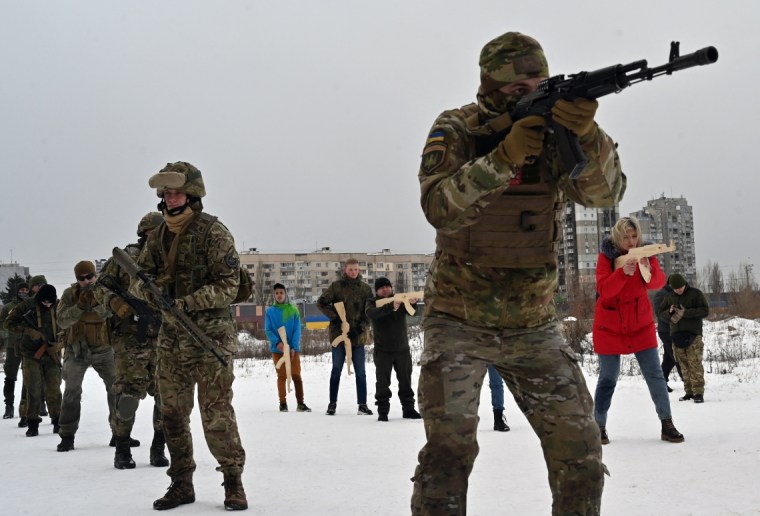CPJ’s Gulnoza Said on fears for journalists as Russia invades Ukraine
After threatening to do so for months, Russian President Vladimir Putin has launched a full-scale invasion of Ukraine, a move that U.S. President Joe Biden called “a premeditated war that will bring a catastrophic loss of life and human suffering.”
Now, Ukraine is bracing for full-scale conflict.

Here, we speak to Gulnoza Said, CPJ’s Europe and Central Asia program coordinator, about what we can expect for journalists in Ukraine.
What do you fear most for journalists in the country?
There are so many potential risks on so many levels for journalists in Ukraine. First, we’re talking about journalists reporting on war zones—so the risks they face would be similar to those journalists face in any war zone—like being killed, injured, or taken hostage.
But in Ukraine, the situation is slightly different because apart from outright invasion in eastern regions of the country or further toward the capital, Kyiv, what we may see is Russia sending a special unit to try to oust the president and plant a new pro-Kremlin president. If that happens, a lot will depend on the Ukrainian army and how law enforcement will react—if they’ll side with the newly planted president or not. In either case, we are likely to see protests in Kyiv and in other parts of Ukraine. And that would be a different set of risks for journalists. The new regime would likely target journalists and activists, especially those critical of Russia—which would mean any independent journalist, from the Russian point of view.
Another challenge is misinformation and disinformation. The information war between Russia and Ukraine has been going on for eight years. Fake footage—doctored videos or videos from other conflicts from previous years—is being distributed by some outlets. But the positive change since the 2014 occupation of Crimea is that many websites in Ukraine and other countries have emerged that fact check reports and debunk the fake ones. I think for those disseminating lies, this round of the war on information is going to be more difficult to win.
Also, there are risks such as DDoS (distributed denial of service) attacks on websites of media outlets, internet shutdowns, and loss of electricity. We may see a situation in which journalists are not able to easily communicate with each other or their editors. Many newsrooms in Ukraine have been working on contingency plans with this scenario in mind.
And, of course, a lot of people, including journalists, are trying to flee Kyiv to western Ukraine or abroad as we speak. So we could be looking at a situation anywhere between what happened in Belarus and in Afghanistan.
What are Ukrainian journalists saying?
Many of the Ukrainian journalists I speak to feel very patriotic and very supportive of authorities. I see on social media that many are trying to enlist to join Ukrainian forces to fight Russian troops. I’ve also heard about a few journalists who have fled from Kyiv to western parts of the country or to Europe.
In 2014, when Russia occupied Crimea, there were separatists in Donbas, Ukraine’s east, who were allegedly supported by Russia. We saw a lot of reporting in the country that was supportive of Ukrainian authorities and then, if any journalist tried to criticize the government, there would be a negative reaction. People would say, “How can you be critical of authorities when we are at war? You are not patriotic enough.”
This is not true. It’s the job of journalists to report on events without taking any side. That’s the biggest challenge for every Ukrainian journalist who is working in Ukraine these days.
Is CPJ planning to help in any way?
We are ready to start helping journalists in distress in Ukraine and beyond. We have issued safety advisories for journalists covering Ukraine and we have done a lot of prep work. We are coordinating our efforts with other organizations because we understand that there could be lots of pleas for help from journalists and others. We’re looking at different ways to help and respond to assistance requests. We stand ready.
CNN’s Amanpour speaks to CPJ’s new president, Jodie Ginsberg

In January, CPJ announced we had found our new president, press freedom advocate Jodie Ginsberg. Until Ginsberg takes her place at the head of the organization in April, Robert Mahoney, who for years has served as CPJ’s deputy executive director, has been appointed executive director.
Here, on her “Democracy in Focus” podcast on CNN, Christiane Amanpour speaks to Ginsberg and NYU journalism professor Jay Rosen. “It’s clear that the decline in press freedom,” Ginsberg said, “[is] a symptom of a decline in democracy more generally.”
Must-reads
In a series of moving interviews, CPJ asked five Afghan journalists what they chose to put in the one bag they were allowed to bring with them when they fled the country last year. One of them, who brought a jar of soil, said, “It is a piece of Afghanistan that we will keep with us.”
Some journalists reporting on protests against vaccine mandates for truckers in Canada are being harassed and assaulted. One of them told CPJ, “There’s a general sense that attacking journalists is now normal.”
CPJ called on Israel to fully investigate allegations that its police used Pegasus spyware to hack journalists’ phones. “By allowing Pegasus spyware to proliferate worldwide,” CPJ said, “the Israeli government has unleashed a monster that now appears to be going after Israeli journalists.”
CPJ in the news
“Daniel Ortega’s regime sentenced journalist and former presidential candidate Miguel Mora to 13 years in prison,” Oicanadian
“Mexican president Lopez Obrador pushes back at ‘misinformed’ Antony Blinken,” Newsweek
“Senators Rubio, Kaine urge Mexico to protect its journalists,” NBC News
“Sharp rise in murders of journalists in Mexico prompts calls for change,” PBS NewsHour
“Journalists working with UN freed by Taliban,” The Hill
“Fears mount for mental state of imprisoned blogger Mohamed Oxygen after refusal to attend mother’s funeral,” Mada Masr
